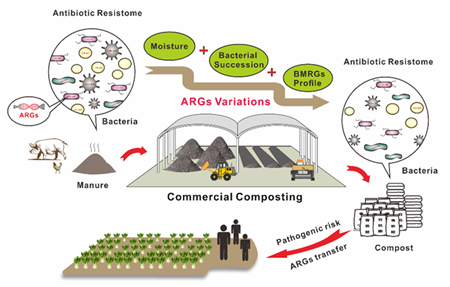Dr Min Zhang et al. from SERI found that commercial livestock composting effectively reduced ARGs
Dr Min Zhang, a post-doctoral fellow in Professor Guang-Guo Ying’s group of SCNU Environmental Research Institute (SERI), recently published a research article titled “Variation of antibiotic resistome during commercial livestock manure composting” in Environment International.

The gut of livestock animals can not completely absorb and transform the antibiotics after use. Most of parent antibiotics are excreted into receiving environments via manure or urine. Therefore livestock manure is an important source for dissemination of antibiotic resistance. Composting is a widely used to turn livestock manure into organic fertilizer. However, the variation of antibiotic resistome during commercial livestock manure composting is not clear.
In this study we investigated a commercial livestock composting process with 171 d of fermentation. The results indicated that the commercial livestock composting technology could effectively reduce the relative abundance of ARGs and MGEs via real-time PCR and metagenomic sequencing. Leucobacter and Mycobacterium which belong to Actinobacteria were the key potential pathogenic host of ARGs. Meanwhile, it was notable that Legionella pneumophila, Staphylococcus saprophyticus, Haemophilus ducreyi and Siccibacter turicensis may be the key potential pathogenic host of ARGs. Moisture, bacterial succession as well as profile of biocide and metal resistance genes (BMRGs) were the determinants which constructed the antibiotic resistome during manure composting. This study has important scientific value and guiding significance for the prevention and control of antibiotic resistance in livestock manure composting.
Publication:
Zhang M, He LY, Liu YS, Zhao JL, Zhang JN, Chen J, Zhang QQ, Ying GG*. Variation of antibiotic resistome during commercial livestock manure composting. Environment International 2020, 136: 105458.
Full text link:https://authors.elsevier.com/sd/article/S0160412019333057